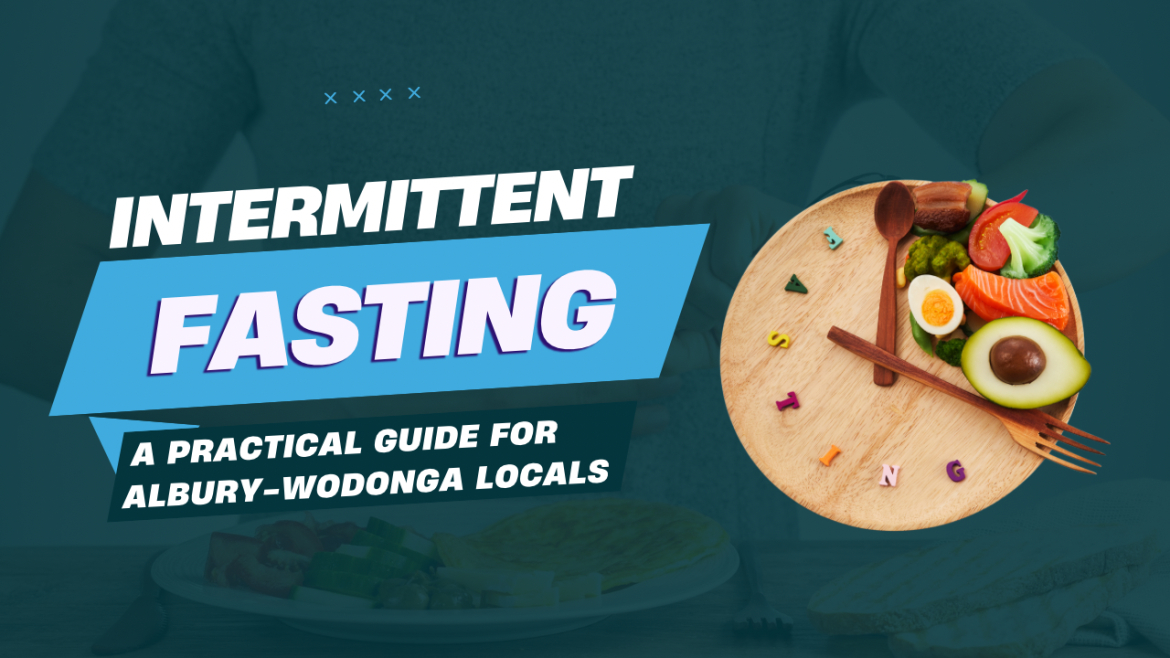Intermittent fasting (IF) has taken the health and fitness world by storm—but unlike most nutrition trends, it’s not about what you eat. It’s about when you eat.
Whether your goal is fat loss, more energy, better focus, or simply reducing meal prep stress, IF might be worth exploring. In this guide, we’ll walk through how intermittent fasting works, its potential benefits and drawbacks, how to get started safely (especially if you’re on medication), and why it might be the right fit for some people here in the Albury-Wodonga region.
? What Is Intermittent Fasting?
Intermittent fasting is an eating pattern where you cycle between periods of eating and fasting. It’s not a traditional diet—it’s a schedule for your meals.
? Popular IF Methods Include:
-
16:8: Fast for 16 hours, eat during an 8-hour window (e.g. 12pm–8pm)
-
14:10: A gentler approach with a 10-hour eating window
-
5:2: Eat normally for 5 days, reduce calorie intake to 500–600 for 2 non-consecutive days
-
OMAD: One Meal a Day – all calories in a 1-hour window (more extreme)
? Top Benefits of Intermittent Fasting
Here’s why intermittent fasting has gained traction with many of our Albury-Wodonga clients:
? 1. Fat Loss and Metabolic Boost
Fasting improves insulin sensitivity and helps your body burn stored fat more effectively.
? 2. Enhanced Mental Focus
Without blood sugar crashes, many people report clearer thinking and better productivity.
? 3. Simplified Eating
Fewer meals can mean less meal prep and easier calorie control—perfect for busy schedules.
❤️ 4. Reduced Inflammation
Research suggests intermittent fasting may help lower inflammation and support heart and gut health.
? 5. Cellular Repair and Longevity
Fasting activates autophagy—your body’s internal "clean-up crew"—which may promote healthier aging.
⚠️ Intermittent Fasting Isn’t for Everyone
While IF offers powerful benefits, it's not suitable for all individuals.
Common challenges:
-
Hunger, irritability, and low energy (especially at the start)
-
Risk of disordered eating if you have a history of restrictive dieting
-
Not ideal for:
-
Pregnant or breastfeeding women
-
People with Type 1 diabetes or adrenal issues
-
Individuals with a history of eating disorders
-
✅ How to Start Intermittent Fasting Safely
If you're based in Albury or Wodonga and considering IF, here’s how to ease into it:
-
Pick a method: 14:10 or 16:8 are great starting points.
-
Ease in gradually: Delay your first meal by 30–60 minutes daily.
-
Stay hydrated: Often, hunger is dehydration in disguise.
-
Focus on quality: Eat protein-rich, whole-food meals when you break your fast.
-
Stay flexible: You don’t have to fast every day to see benefits.
☕ What Can You Drink While Fasting?
To maintain a fasted state, stick to low- or zero-calorie drinks:
✅ Still or sparkling water
✅ Black coffee (no milk or sugar)
✅ Herbal, green, or black tea
✅ A splash of apple cider vinegar in water
✅ Unsweetened electrolyte water
? Avoid:
❌ Sugary or diet drinks
❌ Coffee or tea with milk, cream, or sugar
? Feeling Faint While Fasting? Here’s What to Do
It’s common to feel lightheaded when starting IF. Try this:
-
Hydrate: Drink water consistently.
-
Add electrolytes: Low sodium, magnesium, or potassium can cause fatigue.
-
Break the fast if needed: It’s okay. Your body will adapt over time.
-
Review your meals: Ensure you’re fuelling properly during eating windows.
? Taking Medication? Talk to Your Doctor First
Some medications (like blood pressure or diabetes meds) may require food for safe absorption.
Before starting intermittent fasting, speak with your GP to:
-
Time your medications safely
-
Avoid nausea or side effects
-
Ensure fasting won’t interfere with your treatment plan
If you’re a PT Fitness Albury/Wodonga client, we’re happy to help you coordinate with your healthcare team.
✅ Final Thoughts: Is IF Right for You?
Intermittent fasting can be a powerful and flexible tool for fat loss, energy, and health. But the key is to make it work for you. Start slow. Track how you feel. And remember—it’s not about being perfect; it’s about finding a rhythm that supports your goals and lifestyle.
Want help incorporating intermittent fasting into your fitness and nutrition plan? Book a strategy session with our coaching team at PT Fitness Albury/Wodonga—we’ll make sure it fits your life, goals, and health needs.

